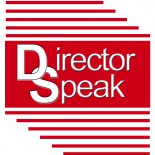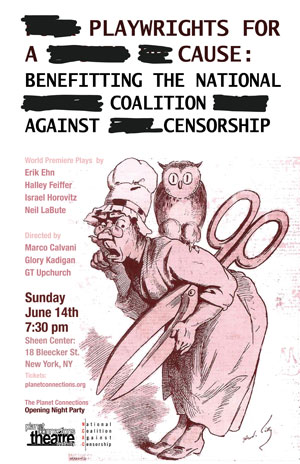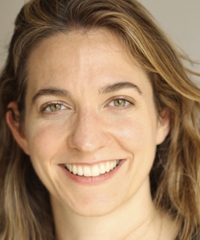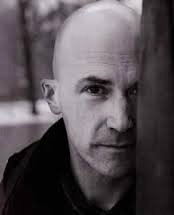GT Upchurch and Erik Ehn speak about “Playwrights for a Cause”
Every year Planet Connections aligns with a charitable cause, and asks playwrights to use their skills to write plays around the ideals of that cause – thus was born “Playwrights for a Cause.” This year, “Playwrights for a Cause” has teamed up with The National Coalition against Censorship to address censorship in the arts. The evening consists of world premiere plays by Erik Ehn, Halley Feiffer, and Israel Horovitz. This year PCTF will also host speakers who will address censorship of women, environmentalism, minorities and LGBT artists. The speakers are Cecilia Copeland, Kaela Mei-Shing Garvin, Michael Hagins, and Mark Jason Williams. The event is at 7:30pm (doors open at 7pm) on June 14, 2015 at Theatre 79 (79 E 4th St). CLICK HERE FOR MORE INFO
DirectorSpeak spoke to two of this year’s participants, director GT Upchurch, and playwright Erik Ehn. We asked about their plays, the Festival, censorship, and of course, about being and working with directors. Here’s what they had to say!
GT UPCHURCH, Director – Directing Halley Feiffer’s “The Play about New Mexico”
CP: Let’s start at the beginning. How’d you get into directing?
GT: It’s a second career for me–I used to teach 7th grade English and I danced in a small modern dance company…. There were a series of events that made me want to learn more about theater in general. But from the first time I directed–which was a 10 minute scene in class at NC School of the Arts–I loved it and knew I wanted to pursue it. Actually, if I’m being honest, the first time I directed anything I was about 10 years old. I used to write and direct plays for my siblings and cousins to perform in. If I’d listened to my 10 year old self, I would’ve discovered theater as an adult much sooner.
CP: You’ve been directing for quite awhile now. Have there been any major shifts in your style, or the way you view your job as a director?
GT: I think early on I felt the need to know more about the plan for the rehearsal room right from the beginning of a process. I’m more trusting now of both myself and my collaborators that we’ll figure it out together in the room as we go along. I do lots of prep ahead of time and then let it go.
CP: You’ve directed in other cities and countries, what do you find most inspirational/unique about directing theatre in New York City?
GT: One of the best things about working in NYC is having the chance to see other people’s work. I’m constantly inspired by and in awe of my colleagues.
CP: What drew you to working with Planet Connections and helping NCAC through the Gala?
GT: It’s a great gift that Planet Connections gives to theater artists that we can use our art to raise money and awareness for a cause. I love it that I’m getting to help raise funds for the NCAC who do great work protecting writers and free speech.
CP: As evidenced by the latest controversy over this event, theatre still has the potential to affect our community. What do you think gives live storytelling such power and connection to an audience/community?
GT: There’s nothing like being in the room with live performers. People like to worry that theater is losing its relevancy in a technologically advanced world, but there’s no replacement for it. You can’t find that exchange of energy between audience an performer in storytelling anywhere else.
CP: In your (rare, I’m sure) downtime, what do you do to recharge your artistic batteries?
GT: I’m an outdoors fanatic so I spend as much time outside as possible to counteract the many hours spent in dark theaters. I also love a road trip and hearing live music.
CP: The play you’re directing is “A Play About New Mexico” by Halley Feiffer. Did it bring any specific directorial challenges to you? What drew you to it?
GT: Halley’s writing makes me laugh and this play is no exception. She uses humor to gracefully get us to look at a form of censorship that’s often overlooked. Directing comedy can be a challenge–but we’ve cast Kelly McAndrew and Lucy DeVito–so we’re all in great hands.
ERIK EHN, playwright of “Three Speech,” directed by Glory Kadigan
CP: You have worked with Director Glory Kadigan before. How does it impact your process as a playwright to have an ongoing relationship with a director? As a playwright, what attributes do you find most helpful in a director?
EE: About repetition: same as knowing what alleys to take to avoid traffic and arrive at the door with the handle you know how to jiggle to get after-hour access… familiarity makes everything go faster in a way that promotes gentle felony and serpentine time. Best in a director – same as with anybody, any time, really: peace, faith, perspective.
CP: When I interviewed you for last year’s “Playwrights for a Cause,” you said, in reaction to the question of theatre serving as a vehicle for social change, “…the more the world sees beauty, the more they will insist on it, in action.” I love this statement and the optimism behind it. Do you feel that it’s part of the “calling” for an artist, to find the beauty in the world and show it to an audience in a way to elicit change, big or small?
EE: Theater loads in giant equipment (dynamos, massive lathes), rots the floorboards, and drops us all through to the center of the earth where we’re held in a magnetic absence of gravity, deeply dark – where we can know nothing, in suspense, and be in accord with our causes and destinies – our live a presence undivided from our making and unmaking absences. Theater is where we fall down, shut up, and wait. Beauty is fallen down, silent, and waiting. (Loud music, to which I’m listening now, can be silent; silence = free of expectation.)
CP: Playwrights for a Cause is supporting the National Coalition Against Censorship. Censorship has always been a problem for artists – censorship from governments, peers and indeed, ourselves. Have you ever had to handle a censorship issue personally? What do you think we learn, as artists, when faced with censorship?
EE: Many acts of censorship on a daily basis are as a medium through which we can travel to recollection. But many acts are also brutal, life-robbing, and wholly uncreative. Art can help us see the obvious – can help us see what is so right-in-front-of-us that we’ve numbed to it. Artists need to resist artlessness, resist the waves of anti-art that are so endemic to the structures that prefer artlessness – prefer the absence of variety, unpredictability, mutability. Such structures: commerce, orthodoxies, fear (as an industry, as the police authority of force).
CP: As evidenced by the latest controversy over this event, theatre still has the potential to affect our community. What do you think gives live storytelling such power and connection to an audience/community?
EE: Hearing/seeing are actions. They change relationships with reality. They are a threat to that which has muted and occluded reality for the sake of waxing over the corpse…
CP: Where do you get your artistic energy from? Who, what or where do you go to in order to re-fill your inner artistic well?
EE: Dark roast and Jesus.
CP: As I mentioned above, this is your second venture with Glory and Planet Connections. How do you feel about that partnership?
EE: Great gratitude to Glory and the collaborative team!





